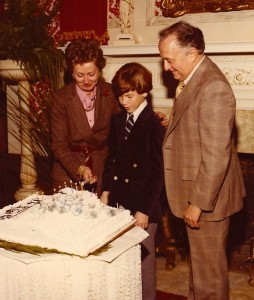When my grandparents came to these shores on a boat (in steerage), they were strangers in a strange land. And they had nothing. They remained that way their whole lives.
“America. Such a strange country, America,” is something my grandfather would say as he shook his head about something peculiar he read in the newspaper or saw in person or on TV (female wrestling was one such thing).
“America. Such a vondehful [wonderful] country, America,” is something my grandfather would say as looked at the success of, and integration of his children and grandchildren into, American society.
My grandparents were not of this country, although they were naturalized citizens. They left their home countries to escape atrocities. So, they were not of those countries either.
They were displaced people their whole lives. But they felt safe here. They were citizens here. They loved this country.
Next to the pictures of Mom and Dad on their wedding day and our various graduation pictures, was a picture of Franklin Delano Roosevelt signing the Social Security Act.
Because a person could do anything and be anything in America. And America took care of its people who worked hard and raised the next generation of contributors to society (and tax revenue).
My parents and we, their children, grew up with a sense of belonging.
We belong. This is our country. We are Americans.
And, in this country, we have the luxury of a prefix — Chinese-, Japanese-, Polish-, Russian-, Anything-American — because
We belong.
That is not to say that being Jewish or of Polish, German, Russian and Prussian descent was easy. Educational and employment discrimination, fights and name-calling of my parents’ generation gave way to schoolyard name-calling and social discrimination in mine.
And, in the next generation, there is still anti-Semitism. Because prejudice will always exist. Because crazy people vandalize synagogues.
But we belong to this country and we can, and do, succeed in this country. But we had to work hard and deal with stupid people and prejudice along the way. That is a fact of life. But because I am a citizen, I have the same rights as the bigots. With education, I can make sure they don’t lord over me.
I think about the Algerians and other North African people in France or “guest workers” across Europe. These individuals and their families can be two or three generations in Europe and still not be citizens. Bigotry and malice can cripple their advancement. They are effectively ghettoized.
In Europe, Asian and African immigrants cannot be citizens. Even when two generations have lived there and no where else. Even when the grandchildren only know how to speak French, Dutch, German, Flemish, etc. and not the language of their grandparents’ country.
And so they DON’T belong. ANYWHERE.
And they have opportunities. NOWHERE.
And their country of birth claims them as citizens. NOT AT ALL.
And they have bright futures and integrate into the larger culture without losing their cultural and religious identities. NOPE. NOT HAPPENING.
(This sounds like the story of the Jews in Europe (other than, ironically, Germany) up until just before Hitler came to power.)
I wonder what would happen if these immigrants and guest workers, or at least their children or grandchildren, could be citizens. I wonder what would have happened in my parents’ and my generation didn’t “belong” to our great nation.
What if they belonged . . . .
 This is a picture of my parents at Jamie’s Bar Mitzvah. Jamie is my second cousin once removed. I have seen him three times in my life. But he and his father, my mother’s first cousin, had special relationships with Mom. I get that. That Bar Mitzvah was probably a little over 30 years ago. Don’t Mom and Dad look great?
This is a picture of my parents at Jamie’s Bar Mitzvah. Jamie is my second cousin once removed. I have seen him three times in my life. But he and his father, my mother’s first cousin, had special relationships with Mom. I get that. That Bar Mitzvah was probably a little over 30 years ago. Don’t Mom and Dad look great?
